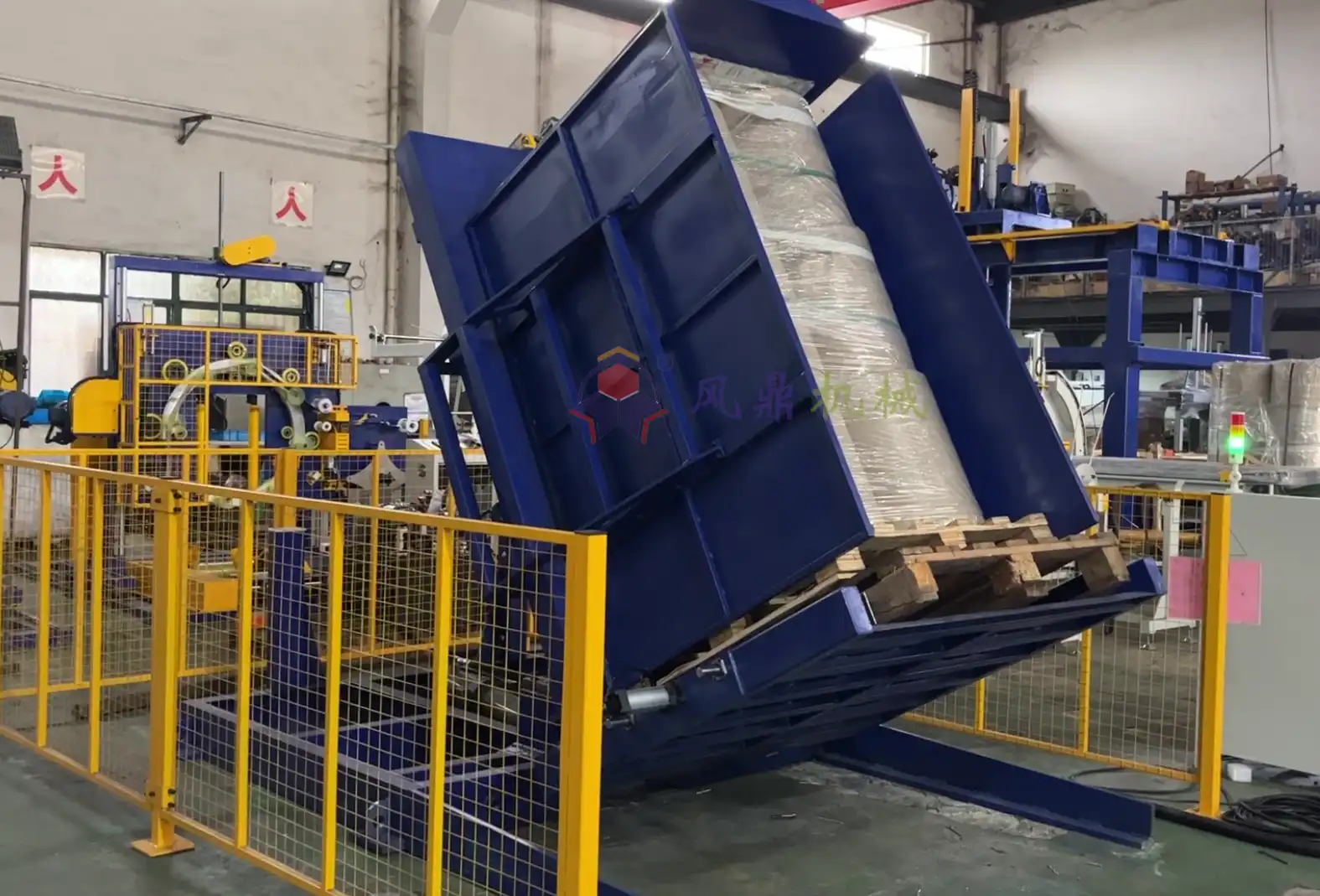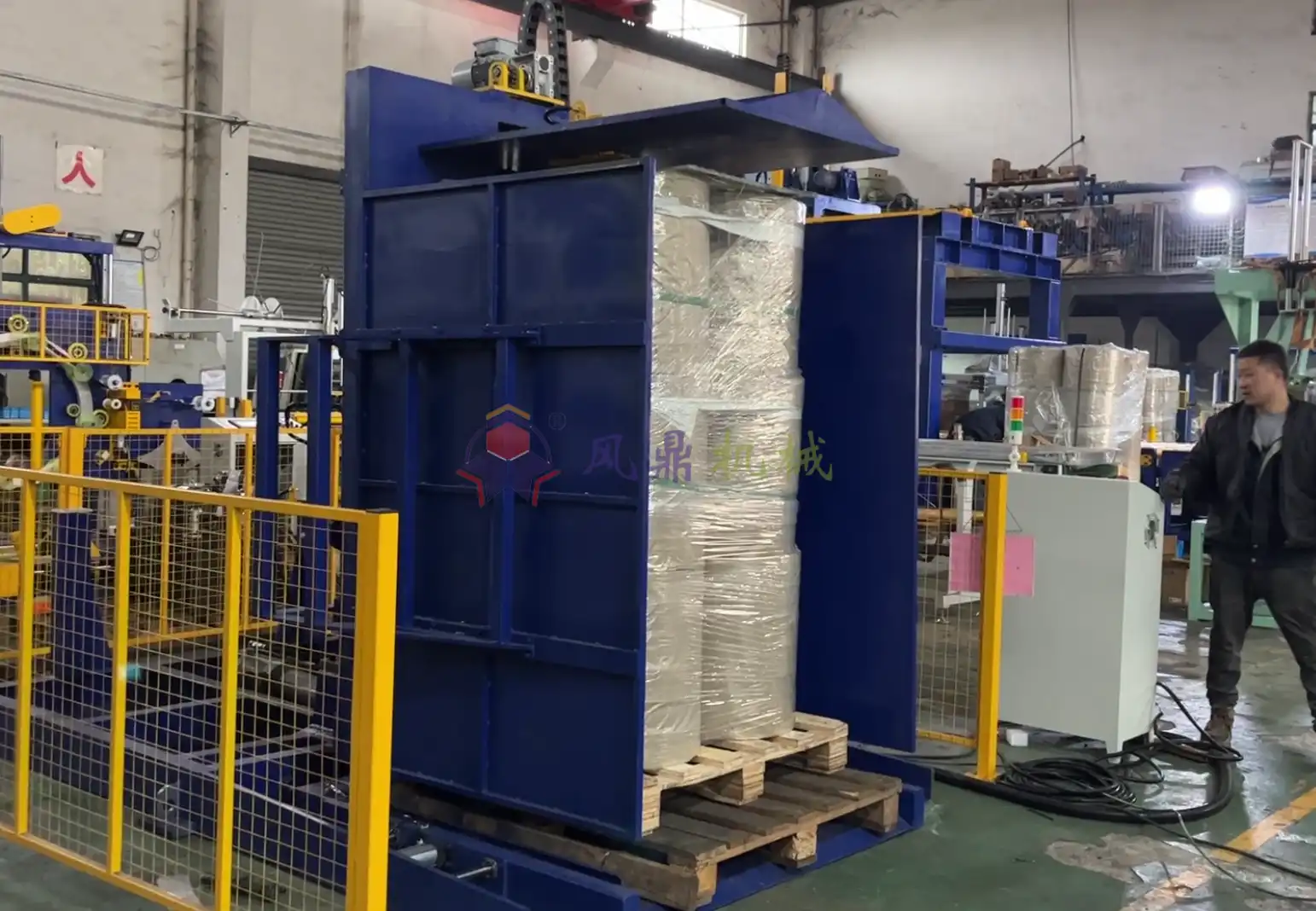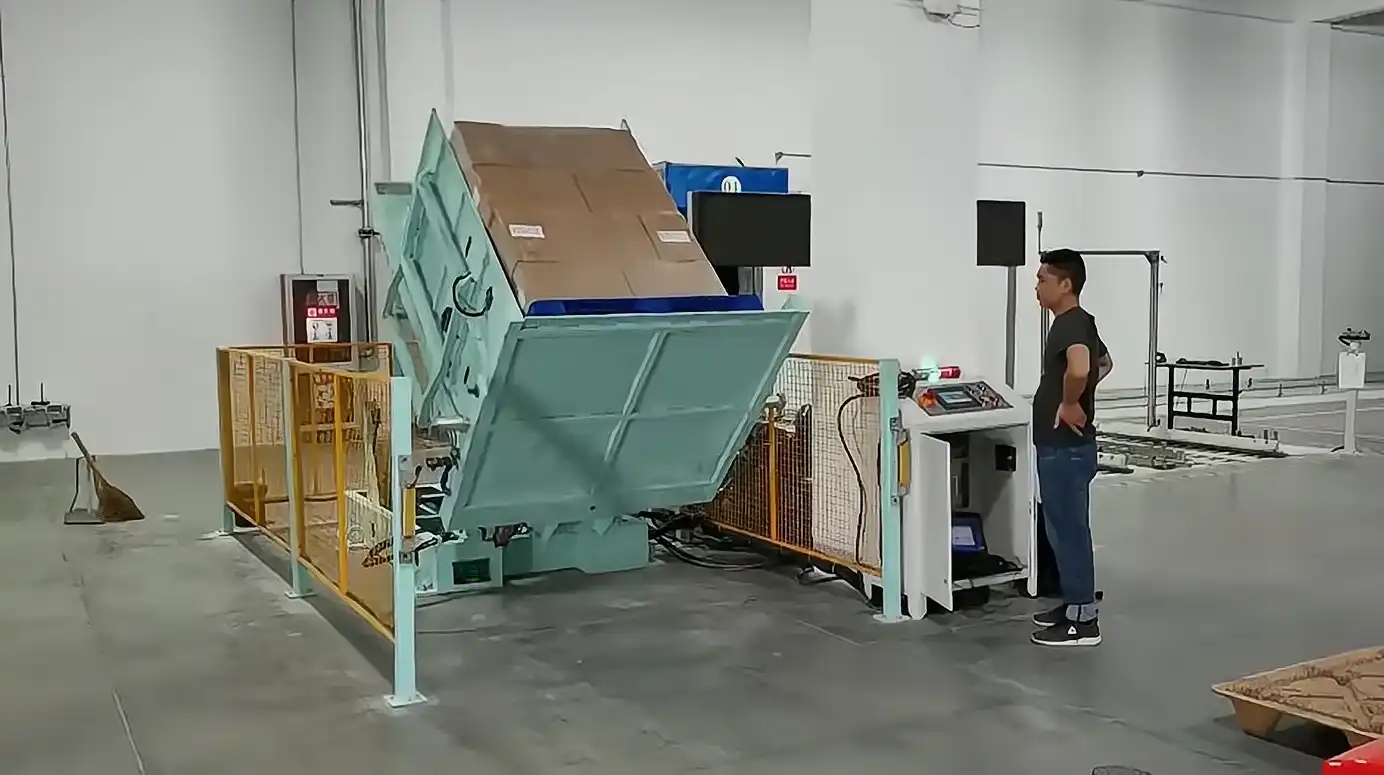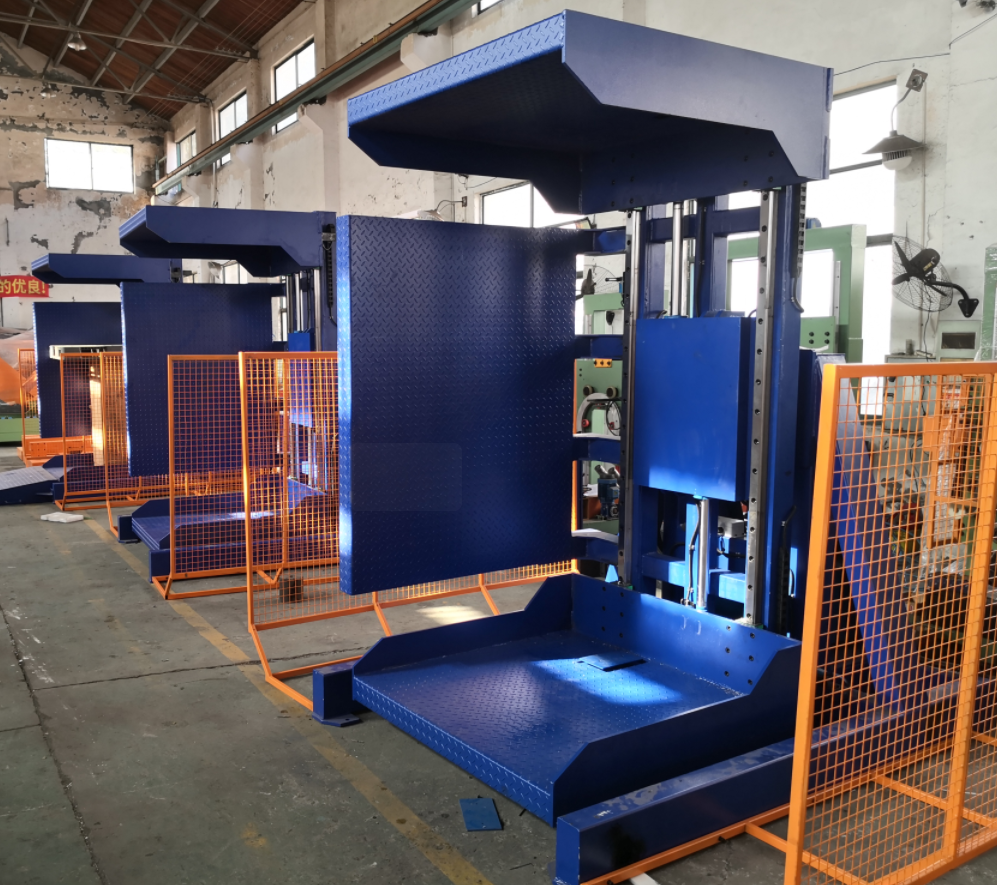How Does Pallet Flipper Help in Logistics?
Many logistics teams face messy pallet transfers. I see how frustration builds when loads shift or damage occurs. A pallet flipper solves these issues quickly, cuts downtime, and streamlines workflow.
I use pallet flippers to fix unstable and risky load changes. They make it possible to rotate, reorient, or replace pallets without heavy manual labor. This approach guards products from breakage, lowers worker stress, and helps me manage more tasks in less time.

I remember a time when my team struggled with flipping pallets by hand, and we spent hours tackling awkward transitions. Our backs and schedules suffered from these long procedures. Then we started using pallet flippers, and we saw a sharp drop in wasted labor. I also saw more space in the warehouse because items were stacked better. This new way made our workflow neater. Now I want to share how these machines support speed and safety for everyone involved. Let me break down the key points.
What Are the Key Benefits of Using Pallet Flippers in Logistics?
Many people face wasted time or product damage when they flip pallets the old way. I saw how back strain and slow turnaround disrupted daily goals. A pallet flipper solves these headaches.
I discovered major benefits after my team started using pallet flippers. These machines help minimize product damage, cut manual labor, speed up pallet swaps, and prevent accidents. They also improve storage use by making it simpler to rotate and reorient goods. This leads to smoother workflows and steadier performance.

Diving Deeper into Key Benefits
I want to explore the main benefits more carefully. I noticed that these advantages are not limited to big operations. Even smaller facilities see real gains. Here is how I break down the core improvements:
1. Reduced Labor Injuries
Workers often strain their backs or arms when flipping heavy pallets by hand. One of my friends had to deal with chronic pain after years of lifting heavy loads. When we added a pallet flipper, that physical wear and tear decreased a lot. This cuts sick days and lowers stress.
2. Protecting Products from Damage
Damaged items mean lost money. I once managed a project where many packages got crushed because we did not have a proper flipping method. A pallet flipper solves this. The rotating mechanism keeps items safe during transfers, which means fewer returns, replacements, or rework.
3. Saving Time
Time is a big factor in logistics. If a crew takes too long swapping pallets, shipments get delayed. A pallet flipper completes this switch in a fraction of the time. This shortens loading and unloading periods, which then leads to meeting shipping schedules faster.
4. Improved Warehouse Organization
My facility struggled with disorganized aisles before. We had trouble fitting products in neat rows. With pallet flippers, we reoriented loads in ways that saved space. This improved our picking and packing operations. It also helped with forklift paths, creating a much safer environment.
5. Versatile Applications
Some people assume pallet flippers only handle standard pallets. However, I have used them for various materials, including delicate boxes and heavier steel coils. Below is a quick table outlining possible applications:
| Material Types | Reasons to Use a Pallet Flipper |
|---|---|
| Standard Pallets | Fast rotation and swapping |
| Steel Coils | Reduced risk of damage or bending |
| Boxes and Crates | Minimal impact during flips |
| Oversized Loads | Easier angle adjustments and secure holding |
I value this flexibility because each shipment can pose different challenges. A pallet flipper helps me adapt to new products without big manual changes in my workflow.
How Can Pallet Flippers Streamline Transportation Processes?
Companies often face chaotic loading docks. Long wait times, shifting cargo, and last-minute changes are common. I once tried to balance those tasks without automation, and it was exhausting. A pallet flipper removes a big part of that chaos.
This machine speeds up the loading and unloading of goods. It helps me flip pallets with minimal disruption. It shortens lead times, lowers shipping errors, and gives me a steadier approach to moving products from one point to another.

Exploring Transportation Streamlining
I like to see how pallet flippers fit into my broader transportation strategy. My focus is to keep cargo secure, reduce manual tasks, and move shipments quickly. These machines play an essential role in each area:
1. Faster Turnaround in Dock Areas
When trucks line up at the dock, every minute counts. I used to see frustrated drivers waiting while we manually flipped pallets to reorient goods. That process took more energy and time. With a pallet flipper, I can rotate full loads or switch pallet orientations in a short burst. This means trucks spend less time at the dock, and the yard becomes more organized.
2. Lower Risk of Product Damage While in Transit
When a load is not oriented properly, it can shift during transit. One time, I received a call about a damaged shipment because the cargo was stacked incorrectly. A pallet flipper helps me line up products well, so there is less movement in transit. That consistency keeps items secure and stable until they arrive.
3. Simplified Handling of Mixed Pallet Sizes
Transportation often involves pallets of various sizes or materials. At one point, I had to swap out different types of pallets for international shipping requirements. A pallet flipper made that swap far easier. I did not have to move loads piece by piece. Instead, I flipped them and replaced the bottom pallet in a single movement.
4. Improved Loading Dock Safety
Safety is a vital part of logistics. Many accidents happen when staff rush to flip or shift pallets by hand. In my warehouse, these incidents dropped after I introduced a pallet flipper. The machine does the heavy rotating, reducing the chance of injury or forklift collisions. My team is much calmer during busy periods.
5. Streamlined Quality Control
Quality checks are another part of the transportation chain. A pallet flipper can make it simpler to inspect the bottom or sides of a load without manually turning it. Below is a short table summarizing how it influences transportation efficiency:
| Streamlining Aspect | Role of the Pallet Flipper |
|---|---|
| Loading Dock Speed | Cuts downtime for truck arrivals and departures |
| Transit Damage Control | Aligns items so they stay secure during travel |
| Pallet Standardization | Allows easy pallet swaps for export/import rules |
| Staff Safety | Minimizes lifting-related injuries |
| Quality Checks | Eases inspections of hard-to-reach areas |
All these points help me see the pallet flipper as a key piece in moving products. It cuts errors, prevents damage, and saves time, which leads to more efficiency at each stage.
In What Ways Do Pallet Flippers Enhance Warehouse Operations?
I know how hard it can be to keep a warehouse organized. My team used to spend long hours rearranging items. We had forklift traffic jams and slow picking times. Then we discovered that pallet flippers can bring order.
They lower labor strain and speed up the rearranging of goods. They also help me move inventory with less risk of damage. This means I can streamline my warehouse layout, keep items more accessible, and make sure everything flows faster.

Deep Look at Warehouse Operations
I wanted to see how a pallet flipper would affect the entire warehouse, from receiving to shipping. I was surprised by the wide impact on daily tasks.
1. Better Space Utilization
One big issue in warehouses is limited floor space. I discovered that flipping pallets let me stack items in a more compact way. This saved a lot of room. I used to store certain goods with no real thought to orientation. Now I can rotate them so they take up less space. This also allowed me to set up dedicated zones for specific product categories.
2. Less Congestion in Aisles
Before, many narrow aisles got congested when we tried to maneuver pallets. Our forklift operators had to do multiple passes. With a pallet flipper, we rotate or swap pallets at a central station instead of a busy aisle. Then we move loads in a simpler orientation. This approach cuts forklift traffic jams and lowers the chance of collisions.
3. Improved Picking Accuracy
When items are oriented neatly, it is easier for pickers to identify and grab products. I had a hard time with mislabeled boxes or overturned crates in the past. A pallet flipper helps me set each load in a predictable orientation. This leads to fewer picking mistakes, less repacking, and a more accurate shipping process.
4. Faster Turnaround for Repacking
Sometimes I need to recheck or repack a shipment. This used to require me to remove each box from the pallet. Now I can flip the entire pallet, take out the items I need, or re-secure them quickly. This is much faster than having staff handle everything by hand.
5. Supports Automation and Future Expansion
I try to integrate as much automation as possible. My goal is to reduce manual labor and keep throughput high. A pallet flipper is one step in that direction. Below is a table showing how it fits into a warehouse automation plan:
| Warehouse Goal | How the Pallet Flipper Contributes |
|---|---|
| Space Optimization | Allows rotation or reorientation for denser loads |
| Order Picking Efficiency | Ensures uniform pallet alignment |
| Employee Safety | Removes manual flipping tasks |
| Quick Repacking Procedures | Speeds up load adjustments |
| Preparation for Full Automation | Integrates with conveyors or robotic systems |
With these points in mind, I have more confidence in the way we run our warehouse. The pallet flipper, while just one part of the puzzle, has a significant impact on daily operations. It saves time, supports safety, and frees up space for other tools. My team finds it easier to keep track of items and handle unexpected changes.
Conclusion
I see pallet flippers as a reliable solution for many logistics challenges. They increase workplace safety, lower damage, and boost efficiency for loading docks, transportation, and warehouse processes. This simple machine helps me cut downtime and stay on schedule, which matters most in my daily operations.